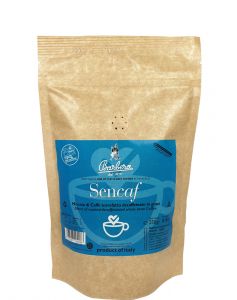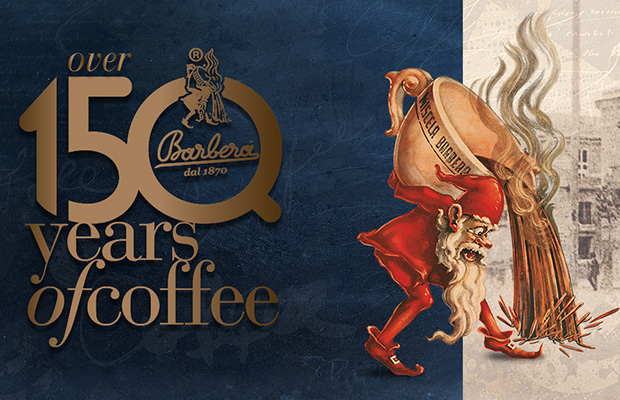
- Blend ratio: 70% Arabica / 30% Robusta
- Aroma(s) : Chocolaty, Nutty
- Type / Nature: Whole beans
- Coffee maker / Machine : Espresso machine (portafilter)
- Caffeine content: Low caffeine
- Package size: 1kg
- Region / Country: South Italy
- Degree of Roast: Dark
- Intensity: Balanced
11-13
Workdays
Extended delivery time
Please note that if you purchase this item, you should expect a longer delivery time for your entire order. We cannot ship other items in your order, that are in stock, ahead of time.
Article No. 1595

- Blend ratio: 40% Arabica / 60% Robusta
- Aroma(s) : Nutty, Malty
- Type / Nature: Whole beans
- Coffee maker / Machine : Espresso machine (portafilter)
- Caffeine content: High Caffeine Content
- Package size: 1kg
- Region / Country: South Italy
- Degree of Roast: Dark
- Low acidity: Yes
- Intensity: Strong
11-13
Workdays
Extended delivery time
Please note that if you purchase this item, you should expect a longer delivery time for your entire order. We cannot ship other items in your order, that are in stock, ahead of time.
Article No. 1597

- Blend ratio: 60% Arabica / 40% Robusta
- Aroma(s) : Chocolaty, Nutty
- Type / Nature: Whole beans
- Coffee maker / Machine : Espresso machine (portafilter), Automatic machine
- Caffeine content: Medium Caffeine Content
- Package size: 1kg
- Region / Country: South Italy
- Degree of Roast: Dark
- Low acidity: Yes
- Intensity: Strong
11-13
Workdays
Extended delivery time
Please note that if you purchase this item, you should expect a longer delivery time for your entire order. We cannot ship other items in your order, that are in stock, ahead of time.
Article No. 1596

- Blend ratio: 70% Arabica / 30% Robusta
- Aroma(s) : Chocolaty, Nutty
- Type / Nature: Whole beans
- Coffee maker / Machine : Espresso machine (portafilter)
- Caffeine content: Low caffeine
- Package size: 250g
- Region / Country: South Italy
- Intensity: Balanced
5-7 Workdays Article No. 1602

- Quantity of pods/capsules : 10
- Type / Nature: Capsule
- Coffee maker / Machine : Capsule Machine
- Region / Country: South Italy
- Degree of Roast: Dark
- Intensity: Strong
5-7 Workdays Article No. 10036

- Blend ratio: 60% Arabica / 40% Robusta
- Aroma(s) : Chocolaty, Nutty
- Type / Nature: Ground
- Coffee maker / Machine : Moka Pot, French Press
- Caffeine content: Medium Caffeine Content
- Package size: 250g
- Region / Country: South Italy
- Degree of Roast: Dark
- Low acidity: Yes
- Intensity: Strong
Unavailable Article No. 1609

- Blend ratio: 70% Arabica / 30% Robusta
- Aroma(s) : Chocolaty, Nutty
- Type / Nature: Whole beans
- Coffee maker / Machine : Espresso machine (portafilter)
- Caffeine content: Low caffeine
- Package size: 500g
- Region / Country: South Italy
- Degree of Roast: Dark
- Intensity: Balanced
Unavailable Article No. 1663

- Blend ratio: 70% Arabica / 30% Robusta
- Aroma(s) : Chocolaty, Floral
- Type / Nature: Whole beans
- Coffee maker / Machine : Espresso machine (portafilter)
- Caffeine content: Caffeine-free
- Package size: 250g
- Region / Country: South Italy
- Degree of Roast: Dark
- Intensity: Balanced
Unavailable Article No. 1665

- Blend ratio: 70% Arabica / 30% Robusta
- Aroma(s) : Nutty, Malty
- Type / Nature: Ground
- Coffee maker / Machine : Moka Pot, French Press
- Caffeine content: Medium Caffeine Content
- Package size: 250g
- Region / Country: South Italy
- Degree of Roast: Dark
- Intensity: Balanced
Unavailable Article No. 1600

- Quantity of pods/capsules : 100
- Blend ratio: 60% Arabica / 40% Robusta
- Aroma(s) : Nutty, Fruity
- Type / Nature: Pods
- Coffee maker / Machine : Pods Machine
- Caffeine content: Medium Caffeine Content
- Region / Country: South Italy
- Degree of Roast: Medium
- Intensity: Balanced
Unavailable Article No. 1601

- Blend ratio: 60% Arabica / 40% Robusta
- Aroma(s) : Chocolaty, Nutty
- Type / Nature: Whole beans
- Coffee maker / Machine : Espresso machine (portafilter), Automatic machine
- Caffeine content: Medium Caffeine Content
- Package size: 250g
- Region / Country: South Italy
- Degree of Roast: Dark
- Low acidity: Yes
- Intensity: Strong
Unavailable Article No. 1599

Unavailable Article No. 2444

Unavailable Article No. 2446

- Quantity of pods/capsules : 18
- Blend ratio: 60% Arabica / 40% Robusta
- Aroma(s) : Chocolaty, Fruity
- Type / Nature: Pods
- Coffee maker / Machine : Pods Machine
- Caffeine content: Medium Caffeine Content
- Region / Country: South Italy
- Degree of Roast: Dark
- Low acidity: Yes
- Intensity: Strong
Unavailable Article No. 1738

- Quantity of pods/capsules : 25
- Blend ratio: 80% Arabica / 20% Robusta
- Aroma(s) : Chocolaty, Nutty
- Type / Nature: Capsule
- Coffee maker / Machine : Capsule Machine
- Caffeine content: Medium Caffeine Content
- Region / Country: South Italy
- Degree of Roast: Dark
- Low acidity: Yes
- Intensity: Strong
Unavailable Article No. 1739

- Quantity of pods/capsules : 25
- Blend ratio: 70% Arabica / 30% Robusta
- Aroma(s) : Chocolaty, Nutty
- Type / Nature: Capsule
- Coffee maker / Machine : Capsule Machine
- Caffeine content: Medium Caffeine Content
- Region / Country: South Italy
- Degree of Roast: Medium
- Intensity: Balanced
Unavailable Article No. 1943

- Blend ratio: 70% Arabica / 30% Robusta
- Aroma(s) : Nutty, Malty
- Type / Nature: Ground
- Coffee maker / Machine : Moka Pot, French Press
- Caffeine content: Medium Caffeine Content
- Package size: 500g
- Region / Country: South Italy
- Degree of Roast: Dark
- Intensity: Balanced
Unavailable Article No. 1950

Unavailable Article No. 2750

- Quantity of pods/capsules : 100
- Blend ratio: 80% Arabica / 20% Robusta
- Aroma(s) : Chocolaty, Nutty
- Type / Nature: Pods
- Coffee maker / Machine : Pods Machine
- Region / Country: South Italy
Unavailable Article No. 10730

- Quantity of pods/capsules : 50
- Blend ratio: 80% Arabica / 20% Robusta
- Aroma(s) : Chocolaty, Nutty
- Type / Nature: Pods
- Coffee maker / Machine : Pods Machine
- Region / Country: South Italy
- Intensity: Strong
Unavailable Article No. 10729

- Quantity of pods/capsules : 20
- Blend ratio: 60% Arabica / 40% Robusta
- Aroma(s) : Chocolaty
- Type / Nature: Pods
- Coffee maker / Machine : Pods Machine
Unavailable Article No. 10851
Barbera Caffe
Elio Barbera (Enrico's son) - Enrico Barbera - Anne Duhre - Justin Bahner
BarberaIn 1870, Domenico Barbera, originally from Piedmont, began roasting coffee with a small machine in the alleys of Messina in Sicily.
The "magician," as his customers affectionately called him, expanded his small business. Soon a new coffee roasting machine was acquired, with the mysterious name "Tornado". Now the Barbera family could proudly roast up to 30kg of coffee at a time.
In 1903 Domenico died very suddenly, leaving his son Antonio to take over the family business in the second generation. Antonio felt equally committed to the family tradition and to the further development of the roastery.
The quality of the coffee, the management of the finances, and the marketing of the coffee were just a few of the many issues that needed to be addressed in order to help Barbera Caffe achieve long-lasting success.
His efforts were crowned with success: between the two world wars, the coffee of the "Magician" was the most drunk coffee in southern Italy. Then, in 1947, Antonio's son Letterio opened a new coffee roasting plant in Naples. This was not without risk, as Naples already had an excellent coffee culture and a number of very good and established roasters. But the willingness to take a risk paid off, because in the end the company built there was a complete success.In 1951 Letterio was able to open its first branch in Milan. With the help of a network of many vendors, the magic coffee was soon enjoyed throughout Italy.
Monitoring the quality
In the 1950s, the era of research and development began. New roasting machines, monitoring of quality, improvement of each step and development of new products were things that Barbera also had to face. After Carmelo, Letterio's son, returned from the United States as a food chemist, he set up Italy's first coffee laboratory, thus improving and developing the individual production steps on a scientific basis.
A simple step, but one that made a big difference. In collaboration with the International Coffee Society, Barbera was the first coffee laboratory in Italy to publish in prestigious journals. The fifth generation also ensures that Barbera grows and becomes internationally known and loved.
- In 1999, Barbera took over the "Tris Caffè" brand in order to increasingly compete in the national market.
- 2002 saw the launch of Barbera's first coffee menu: the aim was to create 18 different creations using the essential ingredient, espresso.
- In 2003, the first Café Barbera opened in Dubai.
Caffe Barbera is now a large company that has won many prizes and various awards due to the excellent quality of its coffees.
Renewable Energy for the Barbera Coffee Company
 |
Caffè Barbera, the Neapolitan roasting company founded in 1870, has relied on SolarSicily to increase its sustainable contribution & embrace a ''Green'' production for all its products.
The installation of the new photovoltaic system has been placed on the roof of the factory located close to Naples, Italy. An important step in the direction of sustainability for a company already ISO 9001 certified.
The photovoltaic system chosen by Caffè Barbera consists of 180 panels (450W) from the LONGI brand, 107 optimizers, 2 hybrid inverters (7 + 7 kWh) and a SolarEdge inverter (66.6 kWh). This renewable energy plant provides a production of 125,200 kWh (125.2 MWh) of renewable energy per year, the equivalent of 32.05 t. C02 - or 1,472 trees planted. In addition, the self-consumption of 49% (61.5 MWh) is needed for the Barbera’s roasting site, which will allow to export over 63.71 MWh of renewable energy to the grid.
Thanks to this installation, Caffè Barbera is able to satisfy the entire needs of its production which will transform the company to a true Eeco-Sustainable reality, using energy from its own renewable & clean energy source to produce the unmistakable premium blends of the ''Coffee Wizard '', which are today exported to over 65 countries worldwide.
 |
 |

 Today, Barbera Coffee is one of the most consumed coffees in Southern Italy. And we understand why. In 1870, Domenico Barbera began roasting coffee with a small machine on the streets of Messina. The perhaps oldest roasting company in Southern Italy continues to be owned by the family. The small coffee magician is the trademark of the traditional roasting house. Which is why the premium blend is called Barbera Mago (the Magician).
Today, Barbera Coffee is one of the most consumed coffees in Southern Italy. And we understand why. In 1870, Domenico Barbera began roasting coffee with a small machine on the streets of Messina. The perhaps oldest roasting company in Southern Italy continues to be owned by the family. The small coffee magician is the trademark of the traditional roasting house. Which is why the premium blend is called Barbera Mago (the Magician).